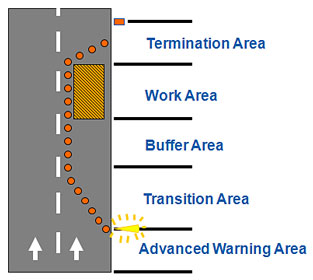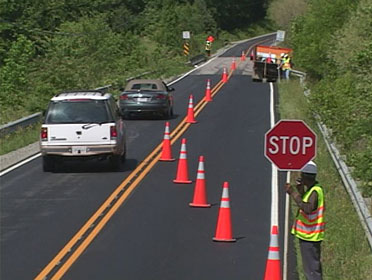Work Zone Traffic Control Training
Printable Version [PDF 764KB]
You will need the Adobe Reader to view this PDF.
Contact Information: WorkZoneFeedback@dot.gov
February 1, 2012
slide 1
Work Zone Traffic Control Training
February 1, 2012
David B. Rush, Chairman, WZSTC
Traffic Engineering Division
804-371-6672
David.Rush@VDOT.Virginia.gov

slide notes
None.
slide 2
Work Zone Safety Training in VA
- Prior to issuance of the 2007 FHWA Final Rule requiring trained personnel, WZS training was sporadic at best in Virginia
- A few one-day training classes were held in conjunction with the VA Road Builders, and a few of our districts conducted training for their maintenance and construction inspection personnel.
- A few ATSSA TCT and TCS classes were also held annually.
- Biggest complaints we heard from the construction industry on WZS training
- Cost
- Time away from work
- Availability of training
- If it's not mandated, I must not need it.
slide notes
Prior to the issuance of the FHWA Final Rule requiring adequately trained personnel in work zones, WZS training was sporadic at best in Virginia –
- A few one-day training classes were held in conjunction with the VA Road Builders, and a few of our districts conducted training for their maintenance and construction inspection personnel.
- A few ATSSA TCT and TCS classes were also held annually.
Needless to say, more training would be required to meet the intention of the final rule.
- Biggest complaints we heard from the construction industry on WZS training
- Cost, Time away from work, Availability of training, and If it's not mandated, I must not need it.
slide 3
Training Requirements – FHWA Final Rule
23 CFR 630 Subpart J
- Specifies that agencies require appropriate training for personnel involved in the development, design, implementation, operation, inspection, and enforcement of work zone related transportation management and traffic control.
- Focus is on Job Duties and Responsibilities related to work zone traffic control.
- The final rule required approved training procedures to be in place by Oct. 12, 2007.
slide notes
Changes to Federal regulations in 23 CFR 630 Subpart J have raised the standard for work zone safety training by increasing the audience on training by specifying that agencies require appropriate training for personnel involved in the development, design, implementation, operation, inspection, and enforcement of work zone related transportation management and traffic control.
The focus was now on "Job duties and responsibilities related to work zone traffic control."
slide 4
WZTC Training Procedures
Work Zone Safety Training Committee
- Scheduling & Contract
- Learning Center
- L&D
- TED
- FHWA
- Maintenance
- Local Assistance
- LTAP
- VTCA
- Consultant
slide notes
Members of the training committee included personnel from:
- Scheduling & Contract
- Asset Management
- VDOT Learning Center
- Local Assistance
- Location and Design
- Traffic Engineering
- Local Technical Assistance program
- VTCA, FHWA, and a consultant member
slide 5
WZTC Training Procedures (cont'd)
Work Zone Safety Training Committee
- Use Existing Training If Possible
- Sensitive to Costs
- Be Flexible
- Make Sense

slide notes
The training committee wanted to make use of existing training courses if possible and,
Wanted training procedures which were flexible, sensitive to costs, and make sense!!
Our goal for the training program is to provide trained personnel who could perform better in installing and monitoring work zones, increasing safety for workers and motorists.
slide 6
WZTC Training Procedures (cont'd)
Train personnel based on their job duties and responsibilities related to work zone traffic control.
- Design
- Construction
- Maintenance/Operations
slide notes
With the charge to "Train personnel based on their job duties and responsibilities related to work zone traffic control," the committee looked at the different areas or categories of WZs and decided they fell into three distinct areas:
- Design activities,
- Construction activities,
- Maintenance and operation
slide 7
WZTC Training Procedures (cont'd)
Training Categories Identification
- Basic WZTC Training – Covers WZ fundamentals, 1 day in length.
slide notes
A Basic WZ Traffic Control course – covers the fundamentals of WZTC and is ideal for short term Maintenance operations, such as shoulder closures, lane closures, and flagging operation on two-lane roadways. The Maintenance wz course we had been teaching fell into this category. The course is one day in length (8 a.m. to 4:30 p.m.).
Areas covered in the course include:
- Liability and Risk
- WZ Types and Component Parts
- TTC Devices
- Making Adjustments to TTC, and
- Roles and Responsibilities
Includes several exercises and one team exercise and an open book exam (passing grade 80% or better)
slide 8
WZTC Training Procedures (cont'd)
Training Categories Identification
- Intermediate WZTC Training – Long Duration operations, 2 days in length.

slide notes
An Intermediate WZ Traffic Control course geared toward Construction and Construction Inspection activities – covers long term operations. There is more focus on TC devices used in these types of operations, including concrete barriers, impact attenuators, pavement markings, markers and eradication, and detouring traffic or closing roadways and multiple traffic phasing. The course is 2 days in length.
Areas covered in the course include:
- Most of what is covered in the Basic WZTC course plus
- Human Factors
- Manuals and References
- Flagging Operations
- Laying Out, Installing, and Removing TTC
- Types of TTC Applications
- Reviewing/Documenting TTC
Includes several team exercises and an open book exam (passing grade 80% or better)
slide 9
WZTC Training Procedures (cont'd)
Training Categories Identification
- Advance WZTC Training – Design of TCPs and TMPs, 2 days in length.

slide notes
An Advanced WZ Traffic Control course which covers WZ Design activities, especially the development of TCPs and TMPs—2 days in length.
Areas covered in the course include:
- Day 1 –
- Standards, Manuals, and References
- Fundamental Principles of TTC
- Human Factors
- Component Parts of TTC
- Types of TTC Activities
- Design Considerations
- Day 2 –
- TTC Devices
- TTC Plans
- Nighttime WZs
- Urban and Other Considerations
Includes several exercises, including one on Temporary Concrete Barriers, and a team design exercise, along with an open book exam (passing grade 80% or better)
slide 10
WZTC Training Procedures (cont'd)
Basic WZTC Course Content
- Liability and Risk
- WZ Types and Component Parts
- TTC Devices
- Making Adjustments to TTC
- Roles and Responsibilities
- Includes several exercises
40 question open book/notes exam

slide notes
A Basic WZ Traffic Control course – covers the fundamentals of WZTC and is ideal for short term Maintenance operations, such as shoulder closures, lane closures, and flagging operation on two-lane roadways. The Maintenance WZ course we had been teaching fell into this category. The course is one day in length (8 a.m. to 4:30 p.m.).
Areas covered in the course include:
- Liability and Risk
- WZ Types and Component Parts
- TTC Devices
- Making Adjustments to TTC, and
- Roles and Responsibilities
Includes several exercises and one team exercise and an open book exam (passing grade 80% or better)
slide 11
WZTC Training Procedures (cont'd)
Intermediate WZTC Course Content
- Most of what is covered in the Basic WZTC +
- Human Factors
- Manuals and References
- Flagging Operations
- Laying Out, Installing, and Removing TTC
- Types of TTC Applications
- Reviewing and Documenting TTC

slide notes
An Intermediate WZ Traffic Control course geared toward Construction and Construction Inspection activities – covers long term operations. There is more focus on TC devices used in these types of operations, including concrete barriers, impact attenuators, pavement markings, markers and eradication, and detouring traffic or closing roadways and multiple traffic phasing. The course is 2 days in length.
Areas covered in the course include:
- Most of what is covered in the Basic WZTC course plus
- Human Factors
- Manuals and References
- Flagging Operations
- Laying out, Installing, and Removing TTC
- Types of TTC Applications
- Reviewing/Documenting TTC
Includes several team exercises and an open book exam (passing grade 80% or better)
slide 12
WZTC Training Procedures (cont'd)
Advanced WZTC Course Content
- Standards, Manuals, and References
- Fundamental Principles of TTC
- Human Factors
- Component Parts of TTC
- Design Considerations
- Developing TTC Plans
- Nighttime WZs
- Urban and Other Considerations

slide notes
An Advanced WZ Traffic Control course which covers WZ Design activities, especially the development of TCPs and TMPs—2 days in length.
Areas covered in the course include:
- Day 1 –
- Standards, Manuals, and References
- Fundamental Principles of TTC
- Human Factors
- Component Parts of TTC
- Types of TTC Activities
- Design Considerations
- Day 2 –
- TTC Devices
- TTC Plans
- Nighttime WZs
- Urban and Other Considerations
Includes several exercises, including one on Temporary Concrete Barriers, and a team design exercise, along with an open book exam (passing grade 80% or better)
slide 13
WZTC Training Procedures (cont'd)
Testing Requirements
A passing score of 80% or higher is required for passing a WZTC course.
Retesting allowed after 24 hours. A second failure requires person to take the course again.
Training cards are issued by the committee.

slide notes
There are testing requirements for each course. A passing score of at least 80% is required on the open book, open note test. Although our information is in English, we had a contractor convert the test into Spanish which we reviewed and approved for use if needed.
Once class information is received by the WZSTC, an approved WZTC training card is issued by VDOT upon successful completion.
Training is good for 4 years. Due to changes in both the Federal WZS program and our program, participants are required to attend another classroom session every four years. We feel it's important that those responsible for the design, implementation, and review of WZTC spend a day or two once every four years to refocus and improve on their WZS skills and abilities.
slide 14
WZTC Training Procedures (cont'd)
Personnel Identification Based on Job Responsibilities
| Areas of Responsibilities | Training Required | ATSSA Cert. Required |
Minimum Required |
|---|---|---|---|
| Maintenance | Basic | No | One per work site |
| Contractor (non-supervisory) | Basic | No | One per work site |
| Utilities | Basic | No | One per work site |
| Maintenance Contract Monitors | Basic | No | All |
| Construction Inspection | Intermediate | No | At least one per project |
| Contractors (Supervisory) | Intermediate | No | At least one per project |
| Regional WZS Coordinator/TED WZ Staff | Intermediate | Yes | All |
| ES&H Safety Engineer | Intermediate | Yes | All |
| Traffic Control Supervisor (Special Provision) | Intermediate | Yes | All |
| District Contract Monitors | Intermediate | No | One per Residency |
| VDOT Land Development/Permit | Intermediate | No | One per Residency |
| Traffic Control Plan/MOT Designers | Advanced | No | One per design team |
slide notes
Three areas of responsibilities will be required to obtain ATSSA TCS Certification. These include our Regional Work Zones Safety Coordinators, Employee Safety & Health Engineers, and TED WZ staff. Also, for projects designated as "significant project" in the development of the TMP, we will pay for the Contractor to supply a certified ATSSA Traffic Control Supervisor. This person will be responsible for the implementation and maintenance of traffic control devices throughout the life of the project.
slide 15
WZTC Training Procedures (cont'd)
Personnel Identification Based on Job Responsibilities
| Areas of Responsibilities | Training Required | ATSSA Cert. Required | Minimum Required |
|---|---|---|---|
| Maintenance | Basic | No | One per work site |
| Contractor (non-supervisory) | Basic | No | One per work site |
| Utilities | Basic | No | One per work site |
| Maintenance Contract Monitors | Basic | No | All |
| Construction Inspection | Intermediate | No | At least one per project |
| Contractors (Supervisory) | Intermediate | No | At least one per project |
| Regional WZS Coordinator/TED WZ Staff | Intermediate | Yes | All |
| ES&H Safety Engineer | Intermediate | Yes | All |
| Traffic Control Supervisor (Special Provision) | Intermediate | Yes | All |
| District Contract Monitors | Intermediate | No | One per Residency |
| VDOT Land Development/Permit | Intermediate | No | One per Residency |
| Traffic Control Plan/MOT Designers | Advanced | No | One per design team |
slide notes
Three areas of responsibilities will be required to obtain ATSSA TCS Certification. These include our Regional Work Zones Safety Coordinators, Employee Safety & Health Engineers, and TED WZ staff. Also, for projects designated as "significant project" in the development of the TMP, we will pay for the Contractor to supply a certified ATSSA Traffic Control Supervisor. This person will be responsible for the implementation and maintenance of traffic control devices throughout the life of the project.
slide 16
WZTC Training Procedures (cont'd)
Delivery methods
Use course material already developed by VDOT or …
Allow existing or new wz courses to be submitted, reviewed, and approved by the WZSTC.
slide notes
To allow for flexibility, the committee decided that we would provide VDOT developed courses as well as allow courses developed by others, such as ATSSA, or NHI, or contractors to be reviewed and approved by the committee if they met the criteria established in our training procedures document. The course includes a PowerPoint presentation, training video, exercises, test, and a class evaluation.
To date, only ATSSA has met our training requirements and has been accepted as an alternate training option. They have tailored their class to be Virginia specific, meeting the requirements we have in our version of Part 6.
slide 17
WZTC Training Procedures (cont'd)
Instructor Qualifications
Basic – completion of the Intermediate or Advanced course;
Flagger certified;
2 yrs. of experience in conducting training courses, and;
At least 2 yrs. of practical experience in highway design, construction, maintenance, or traffic operations.
slide notes
The following qualifications have been determined for course instructors:
Basic – completion of the Intermediate or Advanced course, either VDOT or ATSSA flagger certified, completion of the VDOT Basic Instructor Course (BIC) or 2 yrs. of experience in conducting training courses, and at least 2 yrs. of practical experience in design, construction, maintenance, or traffic operations.
slide 18
WZTC Training Procedures (cont'd)
Instructor Qualifications
Intermediate – ATSSA TCS certified;
Flagger certified;
2 yrs. of experience in conducting training courses, and;
At least 2 yrs. of practical experience in highway design, construction, maintenance, utilities, or traffic operations.
slide notes
The following qualifications have been determined for course instructors:
Intermediate – ATSSA Traffic Control Supervisor certified, either VDOT or ATSSA flagger certified, 2 yrs. of experience in conducting training courses, and at least 2 yrs. of practical experience in design, construction, maintenance, or traffic operations.
slide 19
WZTC Training Procedures (cont'd)
Instructor Qualifications
Advanced – ATSSA TCS or TCDS certified;
Flagger certified;
2 yrs. of experience in conducting training courses, and;
At least 2 yrs. of practical experience in highway design, construction, maintenance, utilities, or traffic operations.
slide notes
The following qualifications have been determined for course instructors:
Intermediate – ATSSA Traffic Control Supervisor certified or Traffic Control Design Specialist certified, either VDOT or ATSSA flagger certified, 2 yrs. of experience in conducting training courses, and at least 2 yrs. of practical experience in design, construction, maintenance, or traffic operations.
slide 20
WZTC Training Procedures (cont'd)
Forms
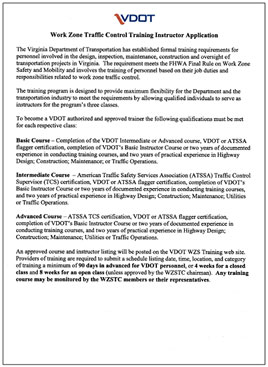
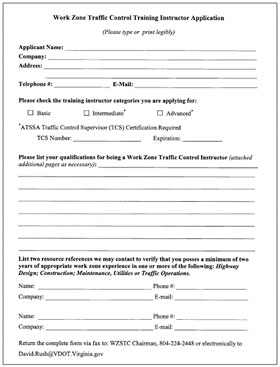
slide notes
We have an on-line instructor application which lists the qualifications needed and asks for two references, along with ATSSA TCS certification numbers and expiration date. The completed form is sent to us here in Richmond for review, and if approved, an instructor card is issued which allows for the purchase of the VDOT training materials.
slide 21
WZTC Training Procedures (cont'd)
- To date, over 450 instructors have been approved.
- Instructors are located in MD, PA, NC, TN, OH, WV, & NH.
- 30 companies regularly conduct training on a monthly basis.

slide notes
The WZTC training committee has approved over 200 instructors, and instructors are located throughout Virginia as well as in Maryland, Pennsylvania, North Carolina, Tennessee, Ohio, West VA, and even one in New Hampshire.
There are 30 companies who regularly conduct the training courses, with courses held nearly every week somewhere in VA.
slide 22
Work Zone Traffic Control Training Champions
Training Champions were designated by each VDOT district and CO division to develop and implement a training plan.
| Name | Location |
|---|---|
| Ken Brittle | Bristol District |
| Milton Thacker | Culpeper District |
| George Romack, P.E. | Fredericksburg District |
| Tim Rawls | Hampton Roads District |
| Shannon Cotulla, P.E. | Lynchburg District |
| Dick Steeg | NOVA District |
| Baron Gissendaner | Richmond District |
| Sean Grinnell, P.E. | Salem District |
| Matt Shiley, P.E. | Staunton District |
| Ray Khoury, P.E. | Traffic Engineering Div |
slide notes
- Each VDOT district and Central Office division was charged to select a WZTC Training Champion to develop a training plan, identify employees who needed the training, and coordinate the implementation of the training procedures for their personnel.
slide 23
WZTC Training Procedures
- Training was required by July 1, 2009, and all projects advertised thereafter.
- Minimum of one trained person on each work crew or project.
- Utility and Permit Personnel included.
- To date, over 25,600 have attended one of the three training courses since we started in 2008.

slide notes
Everyone needing the initial round of training had until July 1, 2009 to obtain it.
As covered earlier, a minimum of one trained person is required on each work crew installing, reviewing and making adjustments, and removing WZTC, with construction and maintenance projects requiring a trained Intermediate WZTC person. Our permitting process also requires trained personnel be identified before the permit is issued.
Since we began the training process in 2008, over 25,600 people have attended one of the three WZTC training classes.
slide 24
WZTC Training Procedures (cont'd)
- Revised training materials have been developed based on the 2009 MUTCD and VA Part 6 changes.
- Will soon be outsourcing the data collection and production of WZTC training cards.

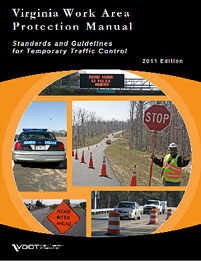
slide notes
We have just completed revising the instructor materials and PowerPoint presentations for all three courses based on changes in the 2009 MUTCD and our recently approved version of Part 6 to the MUTCD.
Due to staff reductions, we will soon be outsourcing the collection of training rosters and production of training cards, reproduction of lost cards, and reproduction and selling of instructor materials, but we will continue the process of reviewing and approving instructor applications, reviewing class evaluations, and spot monitoring classes.
slide 25
WZTC Training Procedures (cont'd)
VDOT WZTC Training Procedures document:
http://www.virginiadot.org/business/resources/wztc/wztc_training_procedures.pdf

slide notes
Our WZTC training procedures are located on our WZS external website, or if anyone is interested, just contact me and I can send you the link.
slide 26
Work Zone Traffic Control Training
February 1, 2012
David B. Rush, Chairman, WZSTC
Traffic Engineering Division
804-371-6672
David.Rush@VDOT.Virginia.gov

slide notes
Thanks!!
